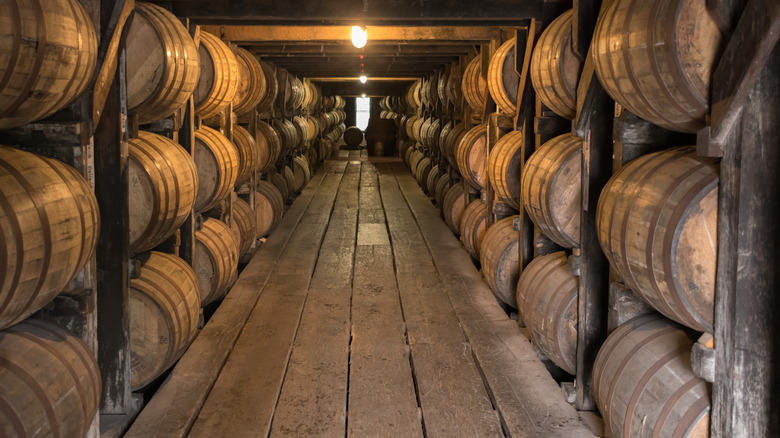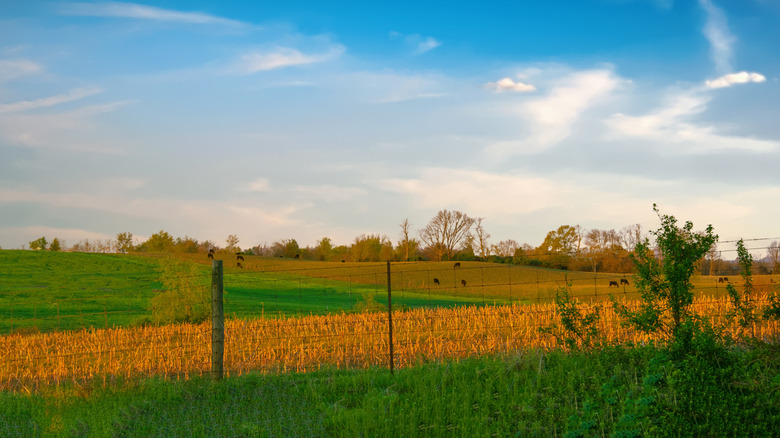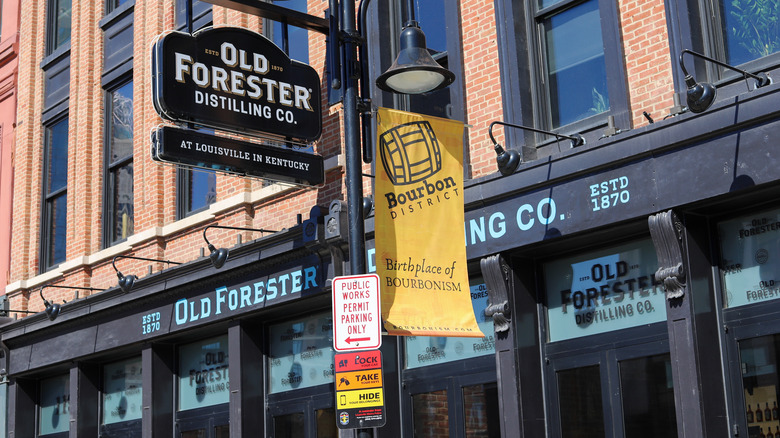Why Kentucky Is The Bourbon Capital Of The US
The phrase "bourbon" is almost indelibly tied to the name "Kentucky," and countless popular bourbons are from Kentucky. Such was the reputation of Kentucky bourbon that it's still a very common myth today that bourbon can only be made in the Bluegrass State. However, this isn't true — while a large portion of the world's bourbon supply does come out of Kentucky , by law, the spirit can be legally produced anywhere in the United States. Still, this hasn't stopped many bourbon aficionados from turning up their noses at bottles distilled outside Kentucky, dismissing them as not being "real" bourbon.
Have you ever been curious about why this reputation came to be in the first place, though? The main reason, as expected, is history. Even before Kentucky became a state in 1792, hundreds of small and large distilleries dotted the landscape. The explanation for why Kentucky was such a distillery magnet varies from one historian to another, but they always revolve around two factors: Corn and water.
Corn and water — the Kentucky's specials
Corn is a critical ingredient in bourbon production. To be truly considered bourbon, the drink mustn't have less than 51% corn. That's why distilleries run through a staggering amount of corn to keep production running. Century Farms, an Iowa distillery offering a program that makes personalized bourbon from local farmers' own corn, has mentioned that it uses 45 bushels of corn to produce two to three barrels.
The bourbon recipe hasn't changed much since the 1700s. When distillers fled the Whiskey Rebellion in the northern states — an armed response to the government's attempt to tax alcohol sales — they naturally sought places rich in corn to continue their craft. Kentucky fit the bill perfectly, thanks in part to the abundance of corn plantations resulting from Virginia's Corn Patch and Cabin Rights Act of 1776. This act offered 400 acres of land to those who built cabins and planted corn in what was then called Kentucky County in Virginia.
Besides corn, another critical component for bourbon production is water. Not just any water — in Kentucky, bourbon is made using mineral water – specifically, pure limestone water. Kentucky sits on top of massive formations of limestone, which acts as a natural filter for the water table running beneath the ground. Back then, distillers would draw water straight from lakes and streams, but today, they run purification systems on-site to make sure that it's totally clean of both dirt and off-tastes before they're run into the stills, according to whiskey historian Fred Minnick in his book "Bourbon Curious: A Simple Tasting Guide for the Savvy Drinker."
Kentucky Bourbon was a political win
Before whiskey bourbon, the go-to spirit for Americans was rum. Congress, facing backlash over taxing whiskey production, opted to tax rum and its main ingredient, molasses, instead. Now that rum's more expensive, people naturally turn to something more affordable — whiskey bourbon (whiskey bourbon is not the same thing as whiskey, by the way) — of which Kentucky now had some of the most skilled distillers in the country. Distillation methods were passed down through families in Kentucky, resulting in the industry's exceptional resilience even through economic downturns and the harsh wallop on their activities that Prohibition would cause down the line.
However, what truly solidified Kentucky as the "Bourbon State" was the establishment of the Kentucky Distillers' Association (KDA) in 1880. This organization has become a powerful industry group and was formed to advocate for distilleries in Kentucky against what it calls "needless and obstructive laws and regulations." Over the years, the KDA has been instrumental in pushing governing bodies for reduced taxes and beneficial policy changes, among other things.
But the pinnacle moment came in 1964 when Congress passed H. Con. Res. 57 of the 88th Congress, declaring bourbon to be "... a distinctive product of the United States ..." This phrase now adorns most bourbon labels, thanks largely to the efforts of John C. Watts, a representative of — you guessed it — Kentucky. His patronage and work, more or less, wrote into law the unique status of Kentucky as the "bourbon capital."


